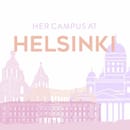Long before Harry set off for Hogwarts, another wizard, named Ged, set out for his training in Earthsea. As he unleashes a shadow that tries to possess him, he must travel far to destroy it. The archipelago world of Earthsea showcases world building at its finest throughout the novels. A Wizard of Earthsea (1968) was for many of us our first Ursula K. Le Guin novel. It’s a coming-of-age story of sorts, suitable for preteens, yet the Earthsea-series’ philosophy and approach to life and death in a fantastical setting is appreciated by adults too — out of the six books in the series, three have a protagonist in their forties and fifties. As author Margaret Atwood describes it: “The darkness includes the hidden and less pleasant sides of our selves – our fears, our pride, our envy. Ged, its hero, must face his shadow self before it devours him.”
Born in 1929, Ursula K. Le Guin, dubbed grand dame of sci-fi, the author of over 20 novels and a long, long list of short stories and essays. Having studied Renaissance literature at college and gaining a master’s degree, she stopped her PhD studies after getting married. Despite being a housewife in the 1950s America, she was able to become a full-time author and her first book was published in 1966. She has published ever since. On her website she writes, “It was tough trying to keep writing while bringing up three kids, but my husband was totally in it with me, and so it worked out fine. Le Guins’ Rule: One person cannot do two fulltime jobs, but two persons can do three fulltime jobs — if they honestly share the work.” Several of her works have been awarded with prestigious awards in the field of fantasy and sci-fi, including the Hugo and Nebula awards, her short story collection Unlocking the Air and Other Stories (1996) even being nominated for the Pulitzer Prize.
Le Guin was politically active only at times, but her ideology is present in her books. Back when science fiction as a genre was seen as inferior to other genres of literature (some say it still is), The Left Hand of Darkness (1969) became an essential read of the feminist movement. The main character is the envoy to a faraway planet with the goal of persuading the planet to join a galactic alliance. The alien race he encounters looks human, but has no sense of sexes and gender — there is only one neuter gender and a person turns male or female once a month but only for reproductive purposes. (As such, the perpetually male main character is considered a pervert for permanently being in the reproductive state.) When you take away sex from humans, what you have left is… still human, for better or worse.
But the feminist theme in Le Guin’s novels flows deeper and is also more subtle than that. Even in worlds of men and women, women have a say and male protagonists are not traditionally masculine (macho) heroes. Granted, Le Guin’s female characters are not necessarily action heroines, but the feminism is that she gives women a voice: for instance, Lavinia (2008) tells the story of a mostly forgotten character from the Aeneid. On the other hand, many of the main characters have a darker skin, subverting another trope in Western fiction. The acclaimed The Word for World is Forest is a strong stand against colonisation and abuse of the land of indigenous people, in this case the peaceful natives and the beautiful nature of the planet period from Earth have named New Tahiti.
Le Guin’s father was a professor in anthropology and her mother a writer. Le Guin’s interest in anthropology shows in her books. The various peoples spread around the galaxy in the Hainish Cycle sci-fi series are given histories, legends and backstories, places have their looks and feels and inhabitants with their own customs, even The Left Hand of Darkness plays out against the backdrop of political drama. Her works are prime speculative fiction: by transporting issues from our world to a world of fantasy, she makes the reader see it from a different perspective. Her writing is also largely influenced by Taoism, or as stated on her webpage: “Taoist thought runs quite deep in the structure of many of my fictions.”
Le Guin died on 22 January 2018 aged 88. Her influence lives on in the numerous books still read today and in the works of the ones she inspired. ”She made me a better writer,” Neil Gaiman said as he presented her with the National Book Foundation medal in 2014. ”Much more important, she made me a much better person who wrote.” Those who have not yet entered the archipelago of Earthsea or the interstellar world of Hain or even the children’s fantasy stories of the Catwings-series are in for a treat. For those who already have read and been to her world… I know at least I will be returning to it.



